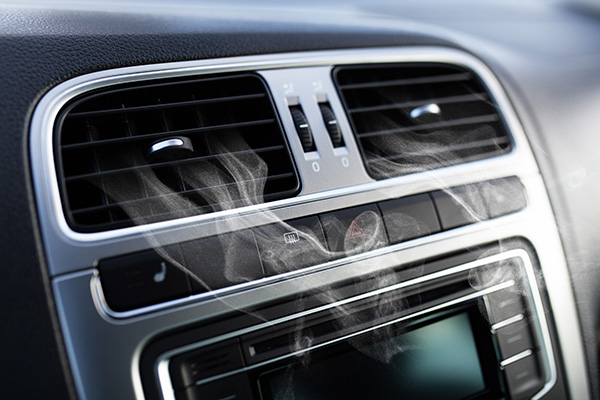
Turning on your car’s heater should bring warm, comfortable air into the cabin, not an unpleasant odor. If you’ve noticed a burning plastic smell when running the heat, it’s a sign that something isn’t quite right. While some causes are minor, others can point to more serious problems that need immediate attention to keep your vehicle safe and reliable.
How Your Heater Works
Your vehicle’s heating system uses engine heat to warm the air inside the cabin. Coolant absorbs heat from the engine and circulates through the heater core, where a fan pushes air across it and into the cabin vents. Because the heater ties into the cooling and electrical systems, strange smells can come from several different components. Understanding the possible sources helps you figure out whether it’s something simple or an issue that needs professional attention.
Common Causes of Burning Plastic Smells
Although the smell itself can be alarming, there are several common reasons it occurs. Some are harmless, but others need to be addressed quickly.
Plastic Debris in the Heater Vents
Sometimes, small pieces of plastic, like shopping bag fragments or packaging, get pulled into the cabin air intake. When the heater runs, the debris heats up, creating a distinct burning plastic odor. If the smell fades after a few minutes, this might be the cause, but it’s still a good idea to have the intake area checked and cleared.
Electrical Wiring Issues
A burning plastic smell can also point to overheating or melting electrical wiring behind the dashboard or near the heater components. This is one of the more serious causes, as damaged wiring can lead to blown fuses, short circuits, or even fires. If the smell lingers or gets stronger when you increase the heat, it’s best to have the system inspected right away.
Overheating Heater Motor or Resistor
The heater blower motor and its resistor regulate airflow into the cabin. When either of these parts overheats, the protective plastic coatings can emit a burnt odor. Left unchecked, this can lead to complete blower failure and loss of cabin heat.
Failing Components in the HVAC System
Some HVAC components are partially made of plastic. If these parts crack or overheat, they can give off a melting-plastic odor. This is especially true if the smell is strongest right when you turn the heater on.
When the Smell Points to Bigger Problems
While debris in the vents can be harmless, persistent burning smells shouldn’t be ignored. Electrical issues or overheating parts tend to worsen over time and can affect other components in your vehicle. A damaged blower motor, for example, can put extra strain on the wiring and fuses, creating a cycle of ongoing problems.
If the burning odor is accompanied by other warning signs, such as smoke, flickering dashboard lights, or reduced airflow from the vents, it’s safest to stop using the heater until the issue is diagnosed. Continuing to run the system could increase the risk of damage or even an electrical fire.
How We Diagnose Heater Odors
Because multiple systems are connected to the heater, finding the source of a burning smell requires a thorough inspection. Our technicians start by checking the heater vents and intake for debris. If nothing is lodged there, we test the blower motor, resistor, and electrical connections to identify overheating components.
We also inspect wiring harnesses, relays, and fuses to rule out hidden electrical problems. Catching damaged wiring early prevents more serious issues and ensures your heating system works safely.
Preventing Heater-Related Odors in the Future
Keeping your vehicle’s cabin air filter clean and replacing it as needed helps reduce the chance of debris getting trapped in the vents. Routine inspections of your heating and cooling systems also catch small problems, such as worn motors or frayed wiring, before they cause odors or failure.
Florida drivers often forget about their heaters until winter arrives, but regular HVAC checks are just as important as air conditioning maintenance. Staying proactive saves you from unpleasant surprises when you finally need the heat.
Get Expert HVAC Service at West Seattle Autoworks
At West Seattle Autoworks in Seattle, WA, our technicians know how to diagnose and repair heating system problems quickly and effectively. Whether it’s a clogged vent, overheating blower motor, or wiring issue, we make sure your vehicle’s HVAC system is safe and fully functional.
If you notice a burning plastic smell when you turn on the heat, schedule an inspection today and get peace of mind knowing your car is in good hands.